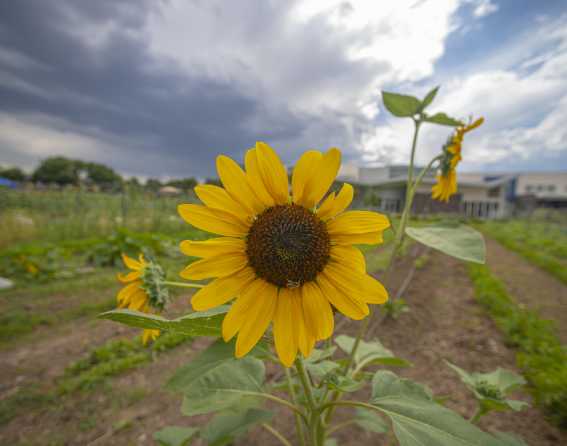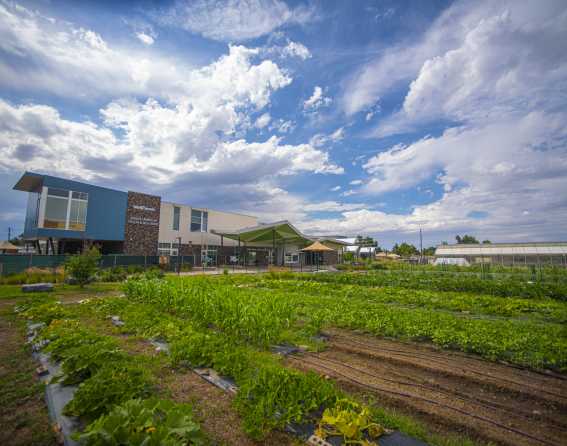It’s a quiet and cloudless summer day in northeast Park Hill. In front of the Dahlia Campus for Health & Well-Being, tidy rows of crops bask in the sunlight on an acre of urban farmland. A nearby greenhouse features one of the city’s largest aquaponics systems supporting the growth of bountiful greens and herbs.
Dahlia Campus Farms & Gardens sprouted on the site of a former shopping center with the help of WellPower (formerly the Mental Health Center of Denver). Built in Park Hill in the 1950s, Dahlia Square was a hub for Denver’s African American community for decades. Anchored by a grocery store, the shopping center also had a fish market and a roller rink.
“Dahlia Square was one of the largest centers for Black-owned businesses west of the Mississippi at its peak,” says Katie Husczcza, associate director of operations and farm services for WellPower.
After decades of decline, the shopping center was demolished in the early 2000s. During the redevelopment process, WellPower conducted a public outreach campaign to see what the community wanted. The list included child care, a dentist and other services. They also wanted fresh food and fish in the heart of one of Denver’s food deserts.
The result is the Dahlia Campus, which opened in 2016 to offer mental health services as part of a broader, integrated approach to mental health. WellPower leadership sought to “maintain the original intention of this place, which is really to be a hub for northeast Park Hill and serve the communities of color that are here,” says Husczcza.
The campus and its varied programs are all interconnected, she notes. “One of our full-time employees runs our horticultural therapy program, so really her whole job is helping our child and family department really integrate with the farm.”
The food is available from a farmstand that’s open to the public on Wednesdays from 4 to 6 p.m. March through December. The offerings are exactly what the community asked for during the planning process.
“We harvest about 40 tilapia once a month, and then have filets available at our farmstand,” says Husczcza.
Besides the fish, the greenhouse supplies the farmstand with “lots of collards and mustards and different kinds of head lettuce and leaf lettuce,” she adds. “Outside, we grow about 30 different varieties of crops. We really focus on what this neighborhood is interested in: a lot of tomatoes and peppers, okra, a lot of carrots and beets and radishes, peas.”
Tours are available by reservation on Mondays, and volunteer opportunities are available year-round. The calendar also includes special events; the big one is an annual fish fry in June.
The operation is a model of sustainable agricultural practices, and the aquaponics greenhouse, home to a population of about 300 tilapia and koi at any given time, is a perfect example.
“In the greenhouse, the water recirculation is probably our biggest conservation point,” says Husczcza. “The fish are eating and living their life in the water, and then the fish waste is what will go on to provide nitrogen to the plants, which help to filter out some of the things in the water, then it sends the water back to the fish. We have pretty limited evaporation from that system, so we don’t have to add a ton of water on a weekly basis, and our primary input is fish food for the fish.”
Produce is stored in a shed decorated with a new, eye-catching mural by Voz y Corazón, a suicide prevention program. “It is actually an off-grid, solar-powered refrigerator,” says Husczcza. The well-insulated shed’s CoolBot “overrides the temperature sensors of a regular window air conditioning unit, so it can drop the temperature of the room down to 38 to 40 degrees [Fahrenheit].”
She adds, “That was funded by the Colorado Garden Foundation, so they helped us with that project. Solar was actually the better deal.”
The low-till system of farming is another sustainable practice. “We try to really reduce the amount that we’re turning the soil over to preserve soil health and bacteria and all the fungi that live in the soil.”
Most pest management is done by hand, and the automated irrigation system was completed in spring 2024.
“It’s way more efficient and we use a lot less water,” says Husczcza.
As part of a pilot project with Colorado State University, Dahlia Campus Farms & Gardens is aiming to build on its water conservation efforts with soil probes that detect the moisture content of the soil in order to only turn on the irrigation when it’s needed.
“I’m always looking for other ways to increase our sustainability, but also ways that other people can learn from and potentially take home,” says Husczcza. “That’s something that we like to do here: teach people the farming practices that we use.”
Dahlia Campus Farms & Gardens is located at 3401 Eudora St. in Denver.




